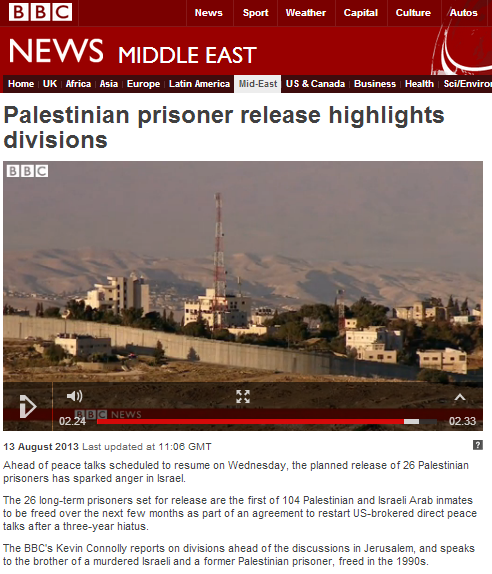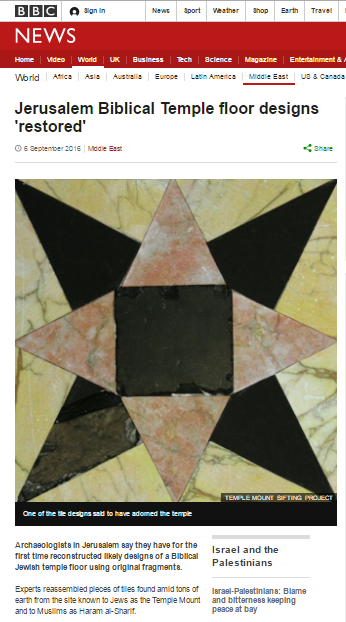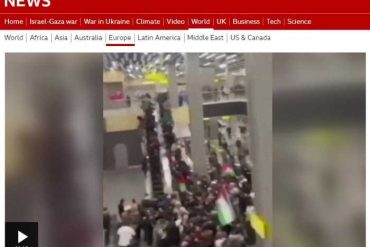In addition to appearing on BBC television news reports, the filmed item below from August 13th by the BBC Jerusalem Bureau’s Kevin Connolly was also promoted on the BBC News website’s main homepage.
The synopsis appearing on the website version states:
“The 26 long-term prisoners set for release are the first of 104 Palestinian and Israeli Arab inmates to be freed over the next few months as part of an agreement to restart US-brokered direct peace talks after a three-year hiatus.” [emphasis added]
It is good to see that the BBC has corrected its previous habit (noted here recently) of mistakenly describing all the prisoners as ‘Palestinian’ in favour of this accurate phrasing.
Connolly interviews a former prisoner released at the time of the Oslo Accords, describing Abdel al Anani as having been:
“…charged with ordering the killing of an Israeli informer..”
From that description, viewers are not able to understand whether the person killed was Israeli or Palestinian. At this point in the report, it would of course have been helpful to audience understanding of this issue had Connolly not only informed viewers that “In the past Israel released Palestinian prisoners at key stages of the negotiations – around four thousand of them in the mid-1990s”, but had also provided information on the subject of the return of many of those former prisoners to terrorism.
“Of 238 terrorists freed in the Jibril deal who reached Judea and Samaria, 48 percent returned to terrorism and were recaptured by the IDF, according to the Almagor Terror Victims Association. And since 2000, it says, some 180 Israelis have been killed in attacks planned by Palestinian terrorists released in prisoner exchange deals.”
Refreshingly though, Connolly also interviews the brother of Ronen Karamani who was murdered in 1990, making this one of the rare occasions upon which BBC audiences get to hear from the relatives of the victims of the prisoners slated for release.
However, later on in the report, against a background of images of a section of the anti-terrorist fence, Connolly says:
“In disputed territories like Jerusalem it is easier to see the problems than the opportunities. The long grey wall here is Israel’s barrier that separates it from the Palestinians.”
In other words, Connolly is both implying that the anti-terrorist fence is a ‘problem’ – rather than the terrorism it prevents – and misinforming audiences with regard to its function by both suggesting that its aim is ‘separation’ and at the same time concealing the fact that it is the actions of terrorists – including some of those released this week and others scheduled for release in the coming months – which made the building of the fence necessary in the first place.
The same filmed report was also featured in an additional written article by Connolly titled “Little hope for talks among Israelis and Palestinians” dated August 13th. Connolly devotes portions of that report to promoting the current BBC theme of building tenders as a threat to peace talks whilst neglecting, as was the case in all the previous BBC reports on the subject, to inform readers that no building freeze has been agreed and therefore there is no factual or logical basis for that notion.
“The talk all along has been more of avoiding a breakdown than hoping for a breakthrough.
And that was before Israel’s Construction Minister Uri Ariel announced the final go-ahead for new building in East Jerusalem and on the West Bank.”
Connolly also promotes the BBC house version of “core issues” which of course does not include subjects such as terrorism, incitement, glorification of terrorism or acceptance of Israel’s existence.
“Anyone who knows the region can rattle off the familiar list of issues from the status of Jerusalem and Israel’s right to live in security to settlement construction and the rights of Palestinian refugees.”
Like his colleague Yolande Knell, Connolly also promotes the morally equivalent stance which herds audiences towards a view according to which the description of the released prisoners as ‘heroes’ is just as valid as their classification as terrorists – despite the fact that they were all convicted of terrorist acts or extreme violence in a court of law.
“To many Palestinians, the prisoners are heroes – fighters in a just cause.”
That practice is of course particularly pernicious when carried out by an organization which on the one hand claims to avoid the use of the word ‘terror’ and its derivatives because “the use of the word will frequently involve a value judgement”, and yet on the other hand displays no qualms about using the term in reports relating to Northern Ireland.
Thirteen years ago the BBC got itself into hot water over the subject of a proposed programme which it was claimed would “make heroes” out of convicted IRA terrorists. A BBC spokesman responded:
“Contrary to suggestions, the drama, if made, would not seek to glamorise terrorism of any kind, he said.”
Obviously, that standard should be applied universally to all BBC programmes and reports relating to individuals who have been convicted of terrorist acts in a court of law in a democratic country – regardless of location. Any other course of action adopted by the BBC clearly opens it up to pertinent questions about politically motivated double standards.





